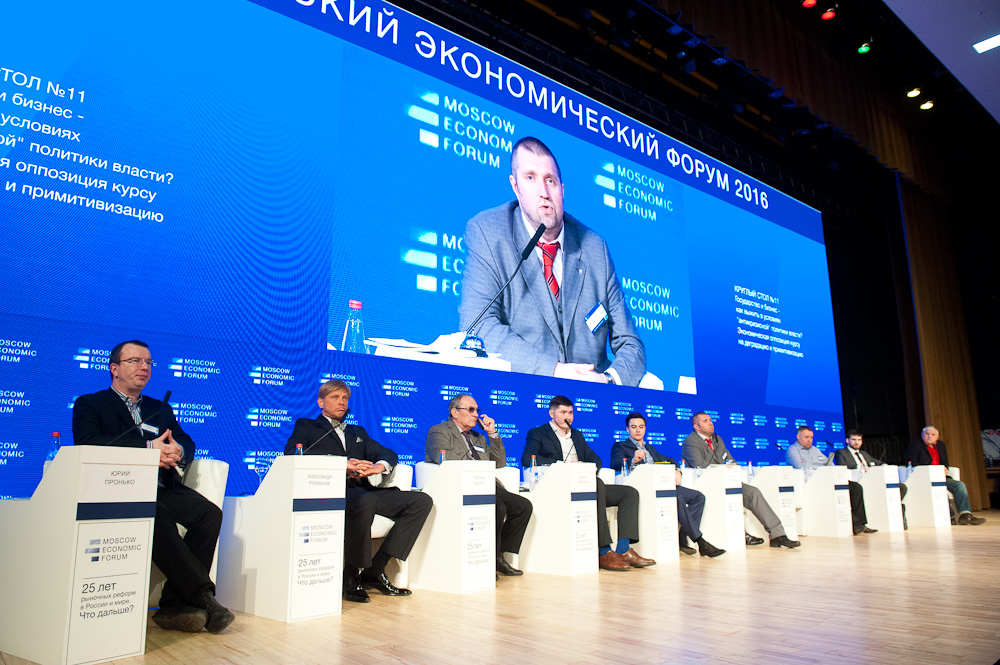
Published: March 24th, 2016
Lomonosov housing MSU
On the theme:
This round table devoted to the problems of proliferation and aggravation of degradation-crisis trends in the economy, and the reaction of the business community for the next round of inflation-devaluation spiral. The anti-crisis policy of the authorities is the anti-crisis only on paper, and the de facto aggravated the decline in production, investment, employment, living standards and consumer activity of russians. The key answer to the question: is there any prospects for Russian non-resource business and the national industry in the conditions of chaos in the currency market, lack of planning horizon, the strongest in 16 years, falling purchasing power of the population, actually closed the domestic capital market, the growing fiscal and regulatory pressure, the growth of tariffs monopolies, budget sequestration and improve the basic production costs.
Moderators:
Vladislav Zhukovsky, economist, trade expert
Dmitry Potapenko, managing partnerManagement Development Group
Among participants:
Andrei Hartley, Igor Bukharov, Sergei Mitrofanov, Vladimir Levchenko, Yury Pronko, Victor Skuratov.
"Government and business — how to survive in the conditions of "anti-crisis" governmental policy?” — a topic which the participants discussed the eponymous round table within the framework of the fourth Moscow Economic Forum.
The main emphasis was placed by the speakers on proliferation and aggravation of problems of degradation-crisis trends in the economy, and the reaction of the business community to improve the various types of costs, including in the form of fees.
Participants of the meeting noted that the anti-crisis policy of the authorities only exacerbates the decline in production, investment, employment, living standards and consumer activity of Russians. And entrepreneurs urged to join in the professional community, to stand together against the various innovation by the State, ruining the business.
In this regard, the union of truckers served as an example. They are opposing the introduction of charging system for travel "Plato". One of the leaders, a spokesman for truckers Andrey Bazhutin shared his opinion on the topic of the round table.
"The new tax will show itself when it is fully operationa. Everyone will be paying even for the passenger car. Introduction adversely affected our entire industry. People can not pay the rents, we can not cope, high costs. Many are already idle. The Ministry of Transport and Rosavtodor said that the final price of products from innovation if they rise, that unbeknownst to the consumer. But in my opinion they do not understand the logistics. Products be come more expensive and not by 1-2%. Prices have risen by 10-15% from November 2015 to March 2016. Money allegedly have let to repair roads, but the roads are not repaired. And we are investing in equipment, paying taxes and fees for this technique which those roads crashes. And we are paying for it "- said Bazhutin.
Our government should be interested in the development of enterprises - said Industrialists and Entrepreneurs Alexander Romanov - it may raise the level of the economy.
"Light industry is an area that is easy to boost even tomorrow. But we do not have factories that produce the skin, doing dressing fur. We need a linen, we do not have. Here there is a cross with agriculture, animal husbandry. Everything has to be developed in parallel, "- said the speaker.
In order for the situation to begin changeing, according to Romanov, we must make the right choices in the fall. In State Duma must come actual business people who knows exactly what each industry needs. There should be no place for actors, athletes and skaters. Party of authorities should be replaces with professionals.
Summing up the meeting, the round table participants noted the strongest in 16 years, falling in purchasing power of the population, actually closed the domestic capital market, the growth of tariffs of monopolies and improving basic production costs. In these circumstances, we are waiting for a collapse even more business conditions. Ultimately, the consumer suffers.
Source: PR department of MEF
Latest news
07.05.2018 MEF-2018: debate "Cultural policy: between individual freedom and the interests of society?"
07.05.2018 MEF-2018: Conference No. 8
07.05.2018 MEF-2018: Conference No. 4
07.05.2018 MEF-2018: Conference No.3
07.05.2018 MEF-2018: Conference No. 2
07.05.2018 MEF-2018: Conference No.1
26.04.2018 McConnell Discusses Information Warfare
20.04.2018 MEF-2018: closing plenary session
17.04.2018 Mr. Freysinger: «Skripal’s case» for relationship between Russia und European Union?
